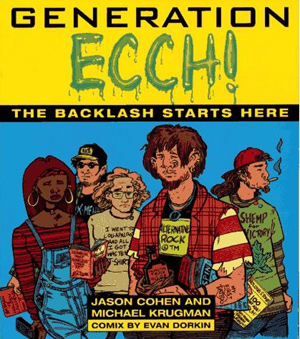
A cultural critic named David Toop once said, “What’s utterly now will soon be thoroughly then; once it becomes then, it might as well be paleolithic….” That’s what this book is all about – the ephemeral nature of “what’s happening now.” Generation Ecch! is written by Jason Cohen and Michael Krugman and illustrated by the brilliant comix artist Evan Dorkin. It’s funny as hell.
The whole generation, created as a marketing strategy, was big news for a long time, leading to such heinous faux pas as the New York Times printing a “Lexicon of Grunge”, which purported to give outsiders the key to insider lingo. It turned out to be a hoax, much as I often suspected back in the Sixties that the journalistic revelations of lists of hip drug terms were a put-on, my favorite being “mohaski” for marijuana – uh-huh.
The text begins with a long examination of all the names that have been given to “Generation X.” They examine Ecch’s taste in comics, and its preference in so-called literature, the “MTVesque brand of fiction” that spawned Fast Sofa, Less Than Zero and of course Generation X. Jay McInerney’s Bright Lights Big City comes in for a big chunk of criticism, not least for the unparalledly annoying device of narration in the second person. The exuberant hatchet job culminates in a parody called Ecch-topia.
Cohen and Krugman have not a single kind word to say for MTV’s “mockudramedy,” The Real World. Its clones, Beverly Hills 90210 and Melrose Place are also savaged. Why waste hours and hours watching the vapid things when you can just read this chapter?
The authors give Ecch-deity Quentin Tarentino a verbal beating equalled only by the recent Baffler articles by Gary Groth and Ray Carney. They take apart John Hughes and The Breakfast Club in irresistibly hilarious style, reserving particularly merciless ridicule for Judd Nelson’s “transparent bid to get his nostrils nominated for an Academy Award.” Fast Times at Ridgemont High is analyzed as the prototypical Ecch movie. Pretty in Pink and Reality Bites are slandered- “Why create a character when you can just saddle someone with a job at the Gap, a Charlie’s Angels lunchbox, and a list of the sixty-six different men she’s slept with?” The holy of holies, My Own Private Idaho, is savaged, followed by an examination of the reasons for such pathetic excuses for heroes as River Phoenix.
There are some disrespectful observations about the fashion for hemp, and a comment on Newsweek‘s concern with the fact that not only grunge kids but regular straight-looking teenagers buy clothes and accessories with pot leaves on them. “The nation is concerned about these clean-cut youngsters: pot T-shirts are gateway fashion, leading eventually to suit jackets emblazoned with syringes.”
The authors joyfully deconstruct Kurt Cobain, “the very manifestation of all that is ecch.” “If Kurt could see the canonization that accompanied his demise it would kill him. Again.” They take us on a tour of Lollapalooza which is characterized as “ridiculous.” The Deadhead phenomenon comes in for even worse. “The keyboard seat in the GD is perhaps the most dangerous job in showbiz. Three, count ’em, three Grateful Dead ivory ticklers have kicked the bucket over the group’s twenty-odd years, yet both drummers live on and on…and on and on and on and on….”
There is a very disrespectful examination of Antioch College’s verbal consent policy in regard to sexual activity. They take on the silliness of most of the doings “online” and of the rave movement. “Pearl Jam is the one band that exemplifies all aspects of the Ecch world: the sappy liberal politics, the sad victim mentality and the classic rock meets grunge sound. Oh yeah, and they’re from Seattle.”
Unlike the perpetrators of too many of the zines that show up in the mail, the authors of Generation Ecch are literate, widely read, very smart, and conscious of the existence of other values and other world-views than the narrow spectrum embraced by the rest of what they call the “rebel without a clue” generation. They even know about stuff like the Living Theater and Judith Malina before she was Grandma Addams. Their lively, funny, irreverent approach is reminiscent of Tom Wolfe’s incisive takes on cultural phenomena, and there isn’t a dull sentence to be found. “If a modern-day Allen Ginsberg were to write a Howl for the age of Ecch, the minute he saw the best minds of the generation he’d drop the poesy and go into the schmatte business.”
First published in Scene, July 1996
Note: the work of Evan Dorkin appeared several times in Salon: A Journal of Aesthetics.